Israel-Hamas War: What happened on day 116?
IDF close to defeating Hamas in Khan Yunis, half of terror group's forces 'out of combat' • Hamas 'studying' Gaza hostage deal, Haniyeh says
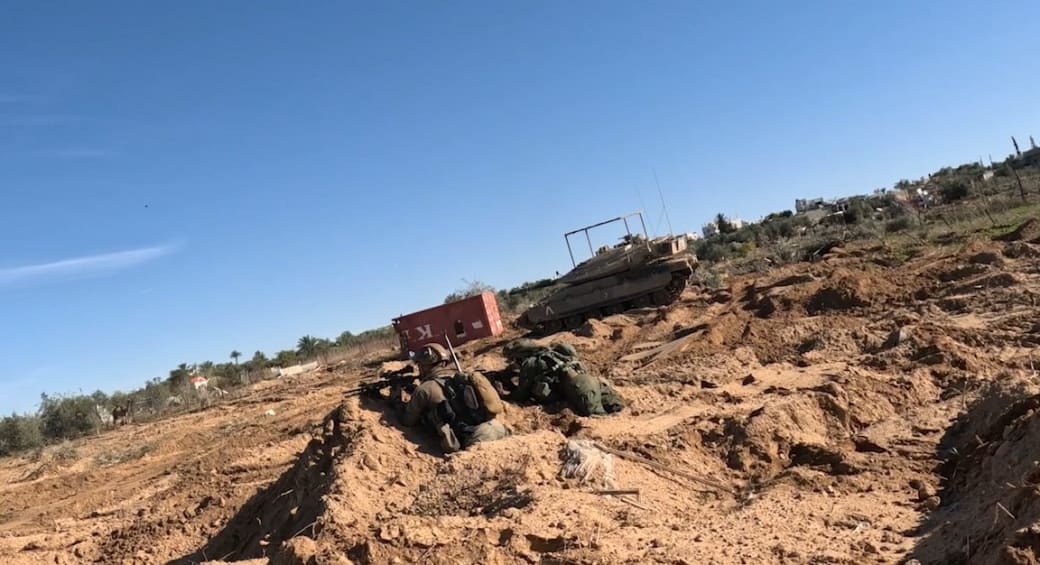

Ceasefire deal may be agreed to by next week - report
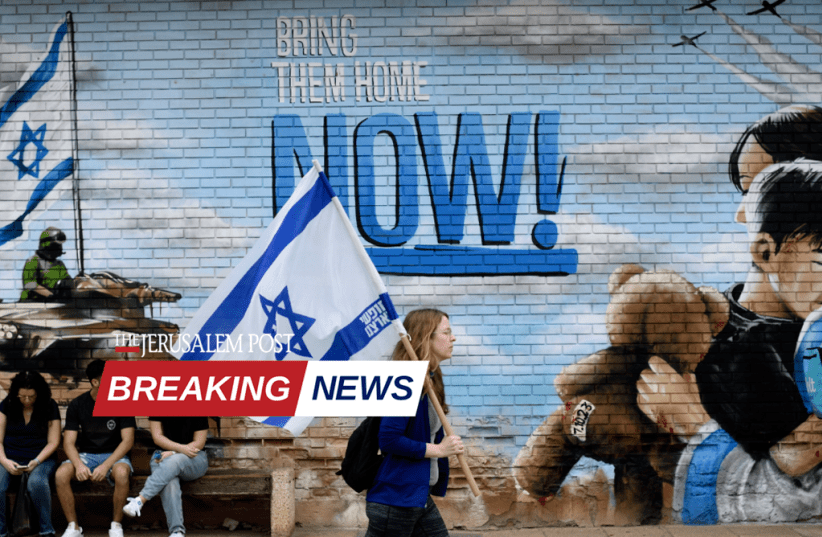
A ceasefire agreement which would include a hostage deal is expected to be reached next week, Kan 11 reported on Tuesday, citing Qatari sources.
Go to the full article >>'The flood will wash them away:' IDF's message to Hamas in viral image
The quote is from the Koran, relating to the biblical flood: “…and the flood washed away their sins." This is a clear allusion to the name Hamas gave to the October 7 attacks.
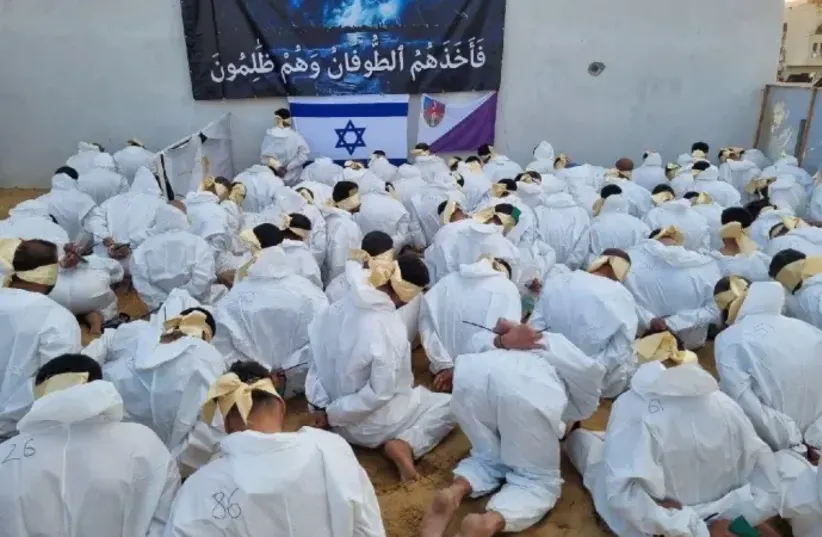
A photo published on social media on Wednesday went viral after it showed suspects arrested by the IDF in Khan Yunis handcuffed and blindfolded. Behind them are the flags of Israel and the Givati Brigade, as well as a massive sign with a quote-turned-pun from the Koran.
The quote in question is taken from a sura in the Koran relating to the biblical flood: “…and the flood washed away their sins." This is a clear allusion to the name Hamas gave to the October 7 attack – “Al-Aqsa flood.”
The message is clear: The action backfired on its perpetrators, who are now paying for their sins.
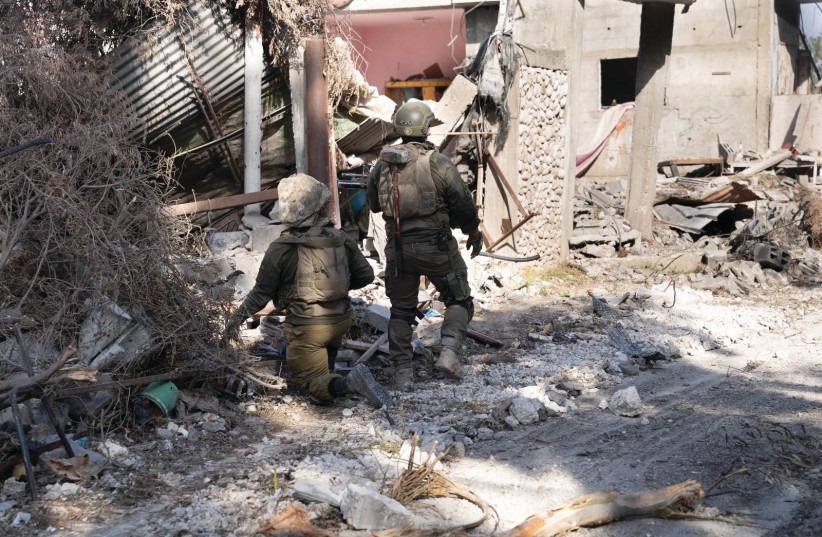
Evoking Sodom and Gomorrah
Adi Cohen, an orientalist, and researcher of the Arab world, explained the meaning of the photo in a conversation with Maariv on Monday.
"For them, the image will evoke Sodom and Gomorrah, a deviation from the right path and the path of Islam," he said.
"The mention of the sins is also important, it relates to people who did not follow the path of Israel, believe in idols and statues, and Allah subsequently punishes them.
"An additional theme is the biblical flood. The people did not want to align themselves; they went against Islam and worshiped pagan idols; therefore, Allah sent the flood upon them except for Noah, who was a righteous man; the idea is a play on the name they themselves called their attack. 'The flood of al-Aqsa'. You are the terrorists, and the flood is yours."
Go to the full article >>UK will consider recognizing Palestinian state, says David Cameron

UK Foreign Secretary David Cameron announced on Monday that Britain will consider recognizing a Palestinian state, the Guardian reported the following day.
Palestinians must have “a political horizon so that they can see that there is going to be irreversible progress to a two-state solution,” Cameron said.
As the war in Gaza continues, Cameron also added that this is part of an attempt to pressure Israeli decision-makers to support such a proposal.
Go to the full article >>Netanyahu: War against Hamas in Gaza will end in absolute Israeli victory

Speaking to an audience at the Israeli West Bank settlement of Eli, Prime Minister Benjamin Netanyahu said that the war against Hamas in Gaza will result in total victory and will not amount to just another round of exchanges, the Prime Minister's Office reported on Tuesday.
"This is not 'another round,' not just exchanges of blows, not just another operation - this is an absolute victory. No less than that. I am committed to it, our soldiers are committed to it, and the absolute majority of the people are committed to it. We will not settle for anything less than an absolute victory," Netanyahu said.
"I hear statements about various deals, so I want to make this clear: we will not end this war with anything less than achieving all our goals. This means eliminating Hamas, returning all our captives, and ensuring that Gaza will no longer pose a threat to Israel," he added.
"We will not withdraw the IDF from the Gaza Strip, and we will not release thousands of terrorists. None of this will happen. What will happen? An absolute victory."
Go to the full article >>Islamic Jihad: 'No deal without ceasefire'
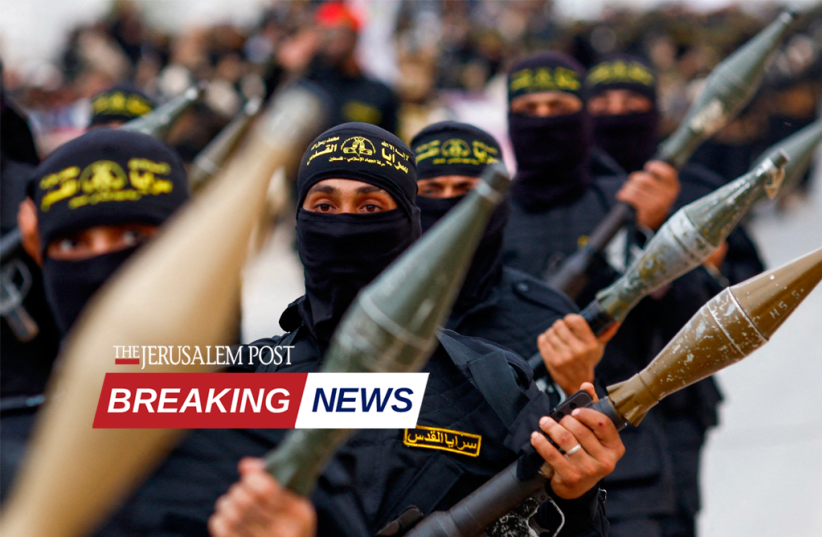
Secretary General of the Islamic Jihad Ziyad al-Nakhaleh said his organization will not agree to a deal without a ceasefire, Israeli media reported on Tuesday.
"We will not engage in any understandings without first guaranteeing a comprehensive ceasefire, the withdrawal of the occupation, and achieving a political solution," he was cited in the media as saying.
Go to the full article >>Russian FM calls to investigate UNRWA employees

Allegations that UNRWA staff were involved in the October 7 attack on Israel should be investigated, Russian Foreign Minister Sergei Lavrov said on Tuesday.
Other countries including the United States, Germany, and Britain have paused their funding to the agency.
The agency said on Friday it had opened an investigation into several employees and severed ties with those people.
Go to the full article >>Why pro-Iran media is worried about Israel and Gaza's Philadelphi Corridor - analysis
Currently, Hamas controls the area along the Egyptian border, and this remains one of the last Hamas strongholds in Gaza.
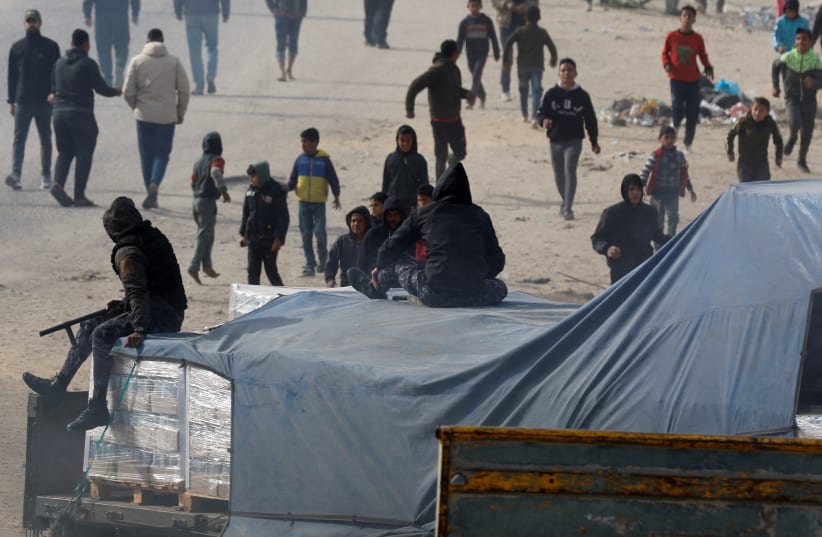
Two articles at the pro-Iranian al-Mayadeen media point to growing concern among Iran and its proxies about potential Israeli operations in the area of Rafah and the Egyptian border. The area in southern Gaza along the Egyptian border is often called the Philadelphi corridor.
The corridor, 14km in length, has been in the spotlight recently because of reports that Israel could operate there after operations in Khan Younis against Hamas. Currently, Hamas controls the area along the Egyptian border, and this remains one of the last Hamas strongholds in Gaza.
The first article at the pro-Iranian al-Mayadeen was on January 28 and detailed reports that “Egypt informed the Palestinian factions of its decision to prevent the occupation from invading the Rafah borders.” The second article on January 30 highlighted an Egyptian military parade and also warned about Israel and the Philadelphi route. “Israeli officials and the occupation media made many statements about the necessity of placing this axis under Israeli control. The campaign was prepared and directed, and it even reached the rabbis,” the report claimed.
What is important here is not so much what is in the report, but the increased focus by Al-Mayadeen on this issue. In general this media network publishes numerous articles every day heralding the “success” of groups such as Hezbollah and Hamas. Each comes with new claims of how Hamas “confronts the occupation” and how Hezbollah has targeted a site on the Israeli border.
Sometimes the articles are pure propaganda, and other times they reflect actual claims by the terrorist groups and provide insight into the strategy and tactics of Hezbollah and Hamas. For instance, when the articles highlight new Hezbollah weapons it is often important to pay attention because it illustrates how Hezbollah may be shifting resources and tactics.
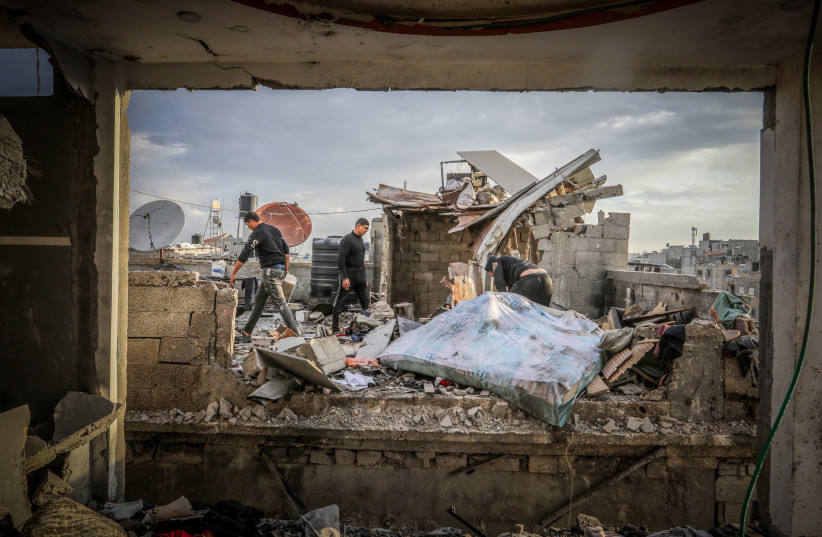
Therefore the focus on the Philadelphi corridor is a new theme by the media and it reflects a concern by Hamas, Hezbollah and perhaps by Iran itself. The recent article on January 30 accuses Israel’s Prime Minister of seeking to “Proceed with the plan to control the narrow border strip” due to “failure” in other parts of the Gaza.
This is the Hamas narrative which was revealed in a recent document found in Gaza, which was reported by Channel 12 on January 29. According to the document, Hamas is purposely trying to portray Israel as having “failed” in operations over several months in the rest of Gaza. The truth is that Israel has been successful and half of Hamas’ terrorists have been either eliminated or wounded.
What’s interesting here is that the pro-Iran media is now openly repeating the narrative that Hamas apparently recorded days or months ago in Gaza. The media has now focused on this narrative to “explain” the claims of Israeli focus on the Philadelphi route. The Al-Mayadeen report also focuses on discussions in Israeli media about this issue. “The city of Rafah must be seized,” the report says Maariv newspaper said. The article then goes on to discuss other theories about Israeli initiatives and mentions Somaliland and Ethiopia. It appears that the Iranian narrative is trying to use reports like this to inflame tensions with Egypt or create controversies.
Unclear what will come next, but Iran may try to inflame
The report concludes with discussions about how Hamas has welcomed Israel’s opposition to Israeli operations along the corridor and also quotes from an Egyptian researcher who asserted that any Israeli operation in Rafah would not go well. The last part of the Al-Mayadeen report says that Egypt has recently spotlighted a review of its 4th division in light of reports about tensions along the border. It wasn’t immediately clear what this was a reference to, as Egyptian media had not appeared to highlight this military unit in the last day.
However, the Egyptian Independent did have a report noting “The Chairman of the Defense and National Security Committee in the Egyptian House of Representatives, Ahmed al-Awady, affirmed Egypt’s support for any decisions and measures taken by President Abdel Fattah al-Sisi in defense of Palestine, and spoke of Egypt’s increasingly strained relations with Israel.”
The report noted “Egyptian-Israeli relations are going through their most difficult stage in their history, he warned, as a result of Israel’s brutal aggression in Gaza Strip.” It went on to say that “Awady slammed Israeli Prime Minister Benjamin Netanyahu‘s statements about Israel’s inability to end its war against Hamas until the closure of Philadelphi corridor along the border between Egypt and Gaza as provocative and obstructive to the efforts Egypt has made to save the lives of children, women and the injured in the Gaza Strip.”
It remains to be seen what will come next in terms of the Philadelphi issue. Pro-Iran media may continue to try to inflame this issue. However, Egyptian media and other media in the region may also shift focus to Rafah and the corridor.
Go to the full article >>Hamas 'studying' Gaza hostage deal, Haniyeh says after reports of rejection
In Washington US Secretary of State Antony Blinken said that the proposal handed to Qatar, “was a strong one and a compelling one that offers some hope."
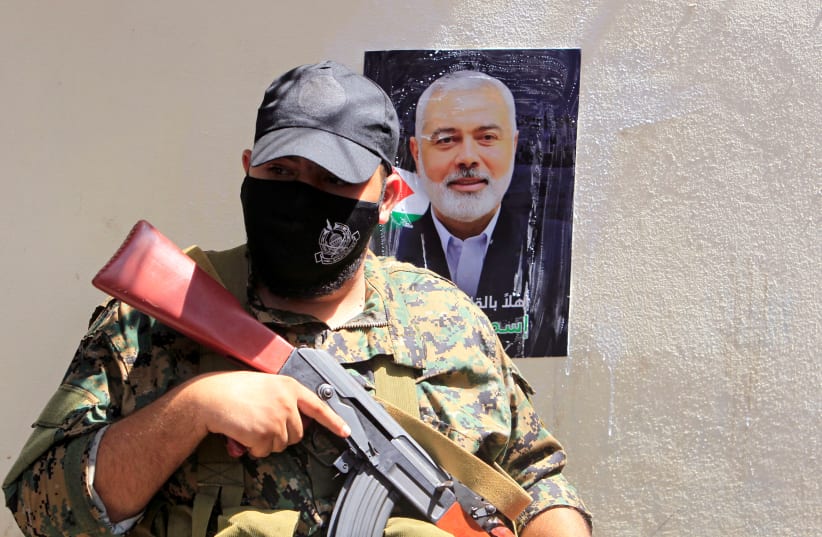
Hamas leader Ismail Haniyeh said on Tuesday that the group had received a ceasefire proposal put forward after talks in Paris and would study it, adding he would visit Cairo for discussions on the plan.
Haniyeh said the group's priority was to end Israel's military offensive and a full pullout of Israeli forces from Gaza. On Monday night, Hamas rejected the hostage deal drafted in Paris because it did not include a permanent ceasefire.
Hamas and the Popular Front for the Liberation of Palestine (PFLP) reiterated that Israel must halt its Gaza offensive and withdraw from the Strip before any prisoner exchange takes place, Hamas said in a statement on Monday.
In Washington, US Secretary of State Antony Blinken said that the proposal handed to Qatar, “was a strong one and a compelling one that offers some hope that we can get back to this process, but Hamas will have to make its own decisions.”
Blinken spoke amid optimism on the part of the US and Qatar, which along with Egypt is mediating a deal, that a framework had been found for an agreement.
A hostage deal has been a top US priority from day 1, Blinken stated.
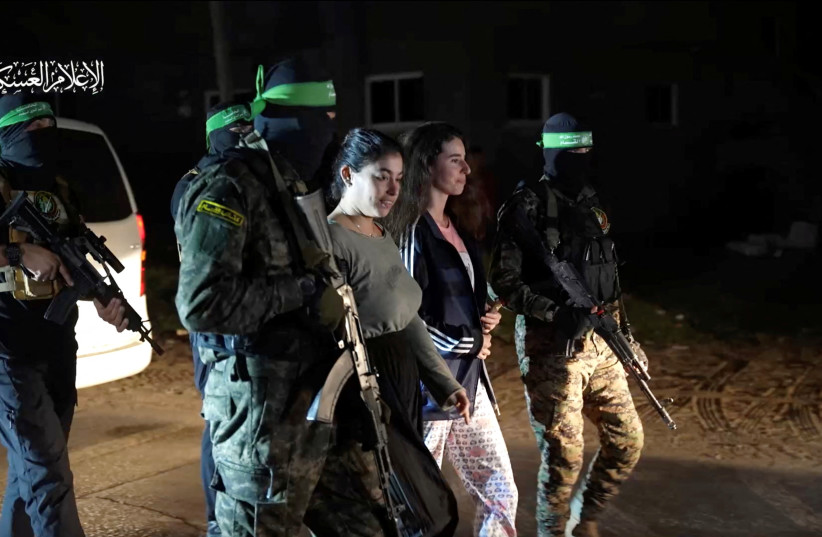
Qatari Prime Minister Mohammed Al-Thani indicated that a hostage deal would be phased with women and children first, as he described the framework agreement that emerged from the Paris talks.
The initial plan for hostage release deal
“The framework that was agreed yesterday with all the parties was a framework based on what has been proposed by the Israelis and what has been a counter-proposal by Hamas,” Thani said during a public interview at an event hosted by think-tank The Atlantic Council.
“We tried to blend things,” he said, adding that this new proposal would now be relayed to Hamas.
Thani arrived from Paris, where he participated in closed-door talks on a deal with CIA Chief William Burns, Mossad Chief David Barnea, Shin Bet Chief Ronen Bar, hostage negotiator Maj.-Gen. (res.) Nitzan Alon, the head of the Egyptian Intelligence Services Abbas Kamel.
Thani said that Hamas rescinded its demand for a permanent ceasefire ahead of any negotiations, but “we moved from that place” to one that could lead to a ceasefire, “which we are all hoping for.”
NBC News Chief Washington Correspondent Andrea Mitchell, who conducted the interview together with David Ignatius of The Washington Post, asked Thani about the details of the deal.
Mitchell explained she understood that there would be “a phased pause in the fighting women and children first, and to continue this in phases as you proceed, with aid going in as well.”
Thani responded, “You are well informed.”
He described how one of the stumbling blocks to the deal had been a Hamas demand for a permanent ceasefire before holding talks, noting that this has now been rescinded.
“There was a clear demand of the permanent ceasefire ahead of the negations,” Thani said, explaining that Qatar had moved Hamas “from that place”, to one “that can lead to a ceasefire in the future. This is what we are all aiming for,” he stated.
The goal of the talks is to free the hostages and to stop the Israeli bombing in Gaza, Thani added.
Advancement in the talks comes as the US is weighing retaliatory military action for an attack that killed three troops in Jordan. Thani said he hoped this would not undercut progress toward a new Israel-Hamas hostage release deal.
“I hope that nothing would undermine the efforts that we are doing or jeopardize the process,” Thani said.
US National Security Council spokesperson John Kirby told MSNBC News that a framework exists for a deal to release the hostages, but he cautioned that nothing had been finalized.
“A lot of promise here, but again, I want to be very clear, there is still diplomacy ahead of us, a lot of discussions to occur before we can get there,” Kirby said.
He clarified, however, that “we don’t have a deal on the table and imminently ready to be announced.”
The US does “think that there is a framework here for another hostage deal that could make a difference in terms of getting more hostages out, getting more aid in, and getting the violence to calm down and that would reduce civilian casualties,” Kirby stated.
He later told reporters that the push was for “a humanitarian pause of sufficient duration that will allow a large number of hostages to be released.” During that period, more humanitarian assistance and go in and casualties will be reduced, Kirby said.
The broad framework under discussion has focused on an exchange of captives for the release of Palestinian security prisoners or terrorists, as well as a pause in the war.
It is presumed that the deal to free the 136 captives would be done in stages, as occurred with the November deal, during which 105 captives were freed during a week-long lull in fighting.
Hamas seized some 253 captives on October 7. KAN News reported that the latest bid to free the hostages included three phases, with the first one focusing on 40 captives including women, children, the elderly, and those who are sick.
The second phase would include male adults who are not soldiers, and the third phase would be for the soldiers, including the female ones.
Part of the deal would include the release of thousands of Palestinian security prisoners, including those convicted of terror offenses, but this latter group is only likely to be part of the agreement at the end.
Hamas said on Monday that releasing hostages it is holding would require a guaranteed end to the war and a full IDF withdrawal.
“The success of the Paris meeting is dependent on the Occupation (Israel) agreeing to end the comprehensive aggression on Gaza Strip,” senior Hamas official Sami Abu Zuhri told Reuters.
Hamas previously said a full release would require that Israel free all of the thousands of Palestinians held on security grounds in its prisons.
A Palestinian official, close to mediation talks, who requested anonymity, said that for Hamas to sign a follow-up deal to the November truce in which it released dozens of hostages, it wants Israel to agree to end the offensive and withdraw from Gaza – through implementation would not necessarily be immediate.
The agreement would have to be endorsed by Qatar, Egypt, and the US, the official said.
Israel has insisted it has no plan to end the war until Hamas is defeated or to relinquish security control of Gaza. One compromise position, however, could be that it would temporarily withdraw from selected target areas.
In an interview with Douglas Murray on Talk TV, Prime Minister Benjamin Netanyahu continued to stress that Qatar could do more to secure a deal, particularly given that top Hamas leadership lived in its country.
“We should demand from Qatar to use their leverage to achieve the release of the remainder of our hostages” as well as to provide proof that hostages have received medications as part of an existing deal with Hamas.
Qatar “has considerable influence [on Hamas] and I expect them to use it,” he stated.
Thani pushed back at Netanyahu’s assertions that the military campaign was an important pressure lever to free the hostages. He said it was “not getting any results to get the hostages back” and that diplomacy was the best route to secure their return.
He also denied claims that Qatar had any special leverage over Hamas, explaining that to the extent it gave them influence, then his country was using that to negotiate a deal.
Qatar’s role is as a mediator that offers solutions, “We do not see that Qatar is a superpower that can impose something on this party.”
Go to the full article >>Ben-Gvir threatens to topple government if Netanyahu agrees to 'negligent' hostage deal
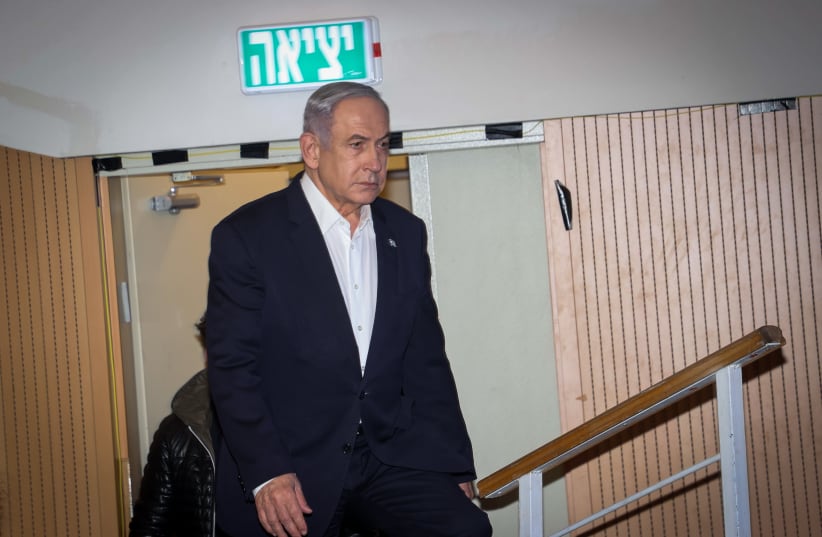
Israel's emergency war government will collapse if Prime Minister Benjamin Netanyahu refuses an acceptable deal for the release of Hamas hostages from Gaza, National Unity minister Chili Tropper warned on Tuesday morning.
National Security Minister Itamar Ben-Gvir responded to this development in a different direction. He said a "negligent" deal would lead to the dissolving of the coalition on X (formerly Twitter).
עסקה מופקרת = פירוק הממשלה
— איתמר בן גביר (@itamarbengvir) January 30, 2024
While unclear without further comment, the minister appeared to claim that a deal for deals' sake would neglect Israel's security needs, and doing so would lead his faction to leave the coalition.
Tovah Lazaroff contributed to this report.
Go to the full article >>Hamas health ministry: Death toll at 26,751
A total of 26,751 Palestinians have been killed and 65,636 wounded in Israeli strikes on Gaza since October 7, the Hamas-controlled Gaza health ministry said in a statement on Tuesday.
The numbers have not been independently verified, and they do not distinguish between combatants and civilians.
The ministry added that 114 Palestinians were killed and 249 injured in the past 24 hours.
Israel-Hamas War: What you need to know
- Hamas launched a massive attack on October 7, with thousands of terrorists infiltrating from the Gaza border and taking some 240 hostages into Gaza
- Over 1,200 Israelis and foreign nationals were murdered, including over 350 in the Re'im music festival and hundreds of Israeli civilians across Gaza border communities
- 136 hostages remain in Gaza, IDF says